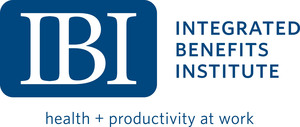Health benefits are considered competitive necessity in managing human capital
SAN FRANCISCO, April 19, 2012 /PRNewswire-USNewswire/ -- Attracting and retaining a skilled workforce is the most important consideration among CFOs in determining whether to continue offering employee medical coverage under the Affordable Care Act (ACA), according to a new analysis of research released by the non-profit Integrated Benefits Institute.
(Logo: http://photos.prnewswire.com/prnh/20120213/DC52028LOGO)
Last month, the U.S. Supreme Court heard arguments over the constitutionality of the ACA. Regardless of the outcome, employers will face a dilemma over whether to continue offering health benefits and managing workforce health or drop coverage and point employees to the individual insurance market.
As a follow on to its CFO research issued in February, IBI released the findings on CFOs' top concerns when asked about the 2014 mandate that will require most employers to offer medical coverage to their workforce or pay fines. After attracting a skilled workforce which was a top-three concern for 80% of the respondents, other factors most important include:
- Impact on employee satisfaction
- Opportunity value of savings for providing medical coverage (i.e. where else an organization might spend resources were they to be diverted from employee health benefits)
- Ability to promote healthy behaviors in their workforce
- Ability to manage medical treatment to improve workforce productivity
"These concerns indicate that CFOs see medical coverage as a competitive necessity in managing human capital, rather than simply a cost to be minimized," said Thomas Parry, Ph.D., president of IBI. "While there is widespread speculation among employers, insurers, benefits professionals and corporate leadership as to how organizations will respond as this historic legislation is rolled out, it's apparent that the C-suite sees the importance of medical coverage not only as a means to maintain a skilled workforce but also as a tool to be leveraged in improving employee health and productivity."
Regulatory concerns?
Considering that this survey question prompted CFOs to think about medical coverage in the context of health care reform, one might have expected aspects of the actual legislation to receive high rankings. This was not the case. Just one in five CFOs gave a top-three rank to the cost of the fine, 13% to the likelihood the provision would remain law and 8% to tax implications. In short, the regulations contained in the ACA may be among the least important factors that financial executives consider in determining health benefits investments.
About the Integrated Benefits Institute
The Integrated Benefits Institute (IBI) provides employers and their supplier partners with resources for demonstrating the business value of health. As a pioneer, leader and nonprofit supplier of health and productivity research, measurement and benchmarking, IBI is a trusted source for benefits performance analysis, research-based approaches, and forums for information and education. IBI's programs, resources and expert member networks advance understanding about the link between – and the impact of – health-related productivity on corporate America's bottom line. For additional information visit: ibiweb.org.
Available Topic Expert(s): For information on the listed expert(s), click appropriate link.
Thomas Parry
http://www.profnetconnect.com/thomas_parry
SOURCE Integrated Benefits Institute
WANT YOUR COMPANY'S NEWS FEATURED ON PRNEWSWIRE.COM?
Newsrooms &
Influencers
Digital Media
Outlets
Journalists
Opted In





Share this article